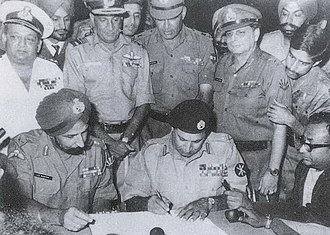Introduction
On March 26, 1971, a significant event took place in the history of South Asia. East Pakistan, which was a part of Pakistan at the time, declared its independence from West Pakistan, giving birth to the new nation of Bangladesh. This declaration of independence marked the beginning of a nine-month-long struggle for freedom, culminating in the establishment of Bangladesh as an independent country on December 16, 1971.
Background
The roots of the declaration of independence by East Pakistan can be traced back to the formation of Pakistan in 1947. The new country was divided into two regions, East Pakistan and West Pakistan, separated by more than a thousand miles of Indian territory. Despite being geographically distant, the two regions were expected to function as one nation.
However, over time, political and economic disparities between East and West Pakistan began to emerge. The central government in West Pakistan dominated the country’s political and economic landscape, often neglecting the needs and aspirations of East Pakistan. This led to a growing sense of frustration and discontent among the people of East Pakistan.
The Language Movement
One of the key factors that fueled the independence movement in East Pakistan was the issue of language. Bengali, the language spoken by the majority of the population in East Pakistan, was not given equal status with Urdu, the language spoken in West Pakistan. This discrimination sparked the Language Movement in 1952, where students and activists protested for the recognition of Bengali as one of the national languages of Pakistan.
The Language Movement gained momentum and became a symbol of the cultural identity of the Bengali people in East Pakistan. It laid the foundation for a broader movement for autonomy and eventually independence.
The Declaration of Independence
On March 26, 1971, in response to the political and economic disparities and the suppression of their cultural identity, East Pakistan declared its independence from West Pakistan. The declaration was made by Sheikh Mujibur Rahman, the leader of the Awami League, in a historic speech delivered at the Racecourse Maidan (now Suhrawardy Udyan) in Dhaka.
The declaration of independence was a significant moment in the history of Bangladesh. It marked the beginning of a struggle for freedom and self-determination, as the people of East Pakistan fought against the oppressive regime in West Pakistan.
The Liberation War
The declaration of independence was followed by a brutal nine-month-long war of independence, known as the Liberation War of Bangladesh. The Pakistani military launched a crackdown on the Bengali population, resulting in widespread violence, atrocities, and mass killings. The Bangladesh Liberation War witnessed the involvement of various resistance groups, including the Mukti Bahini (Freedom Fighters), who fought against the Pakistani forces.
The war took a heavy toll on the people of Bangladesh, with millions of refugees fleeing to neighboring India for safety. The international community also played a crucial role in supporting the cause of Bangladesh’s independence, with countries like India providing military and humanitarian assistance.
The Birth of Bangladesh
After months of intense fighting, the Pakistani forces finally surrendered to the joint forces of the Indian Army and the Mukti Bahini on December 16, 1971. This marked the end of the Liberation War and the birth of Bangladesh as an independent country.
The declaration of independence by East Pakistan in 1971 was a turning point in the history of South Asia. It not only led to the establishment of Bangladesh as a sovereign nation but also served as an inspiration for other independence movements around the world.
Today, Bangladesh continues to commemorate the declaration of independence on March 26th every year as a national holiday. The event serves as a reminder of the sacrifices made by the people of Bangladesh in their quest for freedom and self-determination.
In conclusion, the declaration of independence by East Pakistan on March 26, 1971, was a significant event that shaped the history of Bangladesh. It was a culmination of years of political and economic disparities and cultural suppression. The declaration marked the beginning of a nine-month-long struggle for freedom, which ultimately led to the birth of Bangladesh as an independent nation. The event continues to be remembered and celebrated as a symbol of the resilience and determination of the Bangladeshi people.

